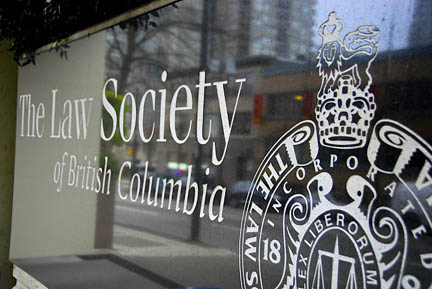If passed, changes outlined in an amendment to B.C’s Legal Profession Act will expand the law society’s ability to suspend or disbar lawyers guilty of serious criminal offences and boost fines for misconduct.

Yesterday, the provincial government of British Columbia tabled
bill 40, the “legal profession amendment act, 2012 for first reading.
The legislation was requested by the Law Society of British Columbia, which wanted more authority to investigate disputes and act on concerns about a lawyer’s dealings with their clients.
Maximum fines for lawyers found guilty of misconduct would increase to $50,000 from $20,000. The society would also be able to make rules to protect private electronic records during investigations of lawyers’ conduct.
As well, law firms would be regulated directly by the society, enabling the society to deal with a broader range of concerns, such as a firm’s accounting policies or supervisory practices for articling students.
B.C. Minister of Justice and Attorney General Shirley Bond introduced the bill April 30.
“The public needs to be confident that lawyers are acting in their best interests and that if they have serious, justifiable concerns about a lawyer’s conduct, the law society will investigate,” Bond said. “These changes give the society more authority to take measures to protect the public on those occasions when substantiated complaints arise.”
The act was passed in 1998 and since that time, regulatory best practices have changed. If passed, the law society says the proposed amendments will provide for better powers to regulate the profession in the public interest.
“The law society is pleased that we will soon be able to operate with up-to-date legislation that will allow us to more effectively regulate the legal profession and protect the public,” said LSBC president Bruce LeRose in a press release.
The changes, which in some cases will tweak the current system, will serve to enhance accountability to the public, streamline process and strengthen the disciplinary powers of the law society, says Dan Bennett, a partner with Bull Housser & Tupper LLP in Vancouver
“I see the big change is really recognizing and strengthening the public interest and involving more non-lawyers in the process,” says Bennett.
With respect to how the law society deals with Canadian lawyers convicted of serious crimes outside of Canada, Bennett says the amendment will help speed the process.
“It’s just a way to make a more summary and immediate process because under the current system, if convicted outside Canada, you still have to re-prove all of the elements here which is cumbersome and takes time. This is streamlining the process to be more responsive and deal with matters quicker,” says Bennett.
Other amendments include:
- An updated mandate that strengthens the commitment of the law society to the protection of the public interest in the administration of justice.
- Decisions of law society hearing panels will be subject to review by a board that will include non-lawyers.
- The law society will have the authority to suspend a lawyer under investigation or impose conditions on the lawyer’s practice.
- The ability to require people to answer questions and produce records in the course of an investigation into a lawyer’s conduct.
- The law society will be able to suspend or disbar lawyers convicted of serious crimes, including those committed outside Canada, without a full hearing.
- The elected board of governors, not all lawyers, will set the annual fees paid by lawyers to fund the law society.
- Where necessary to protect the public, the society would be able to impose an emergency suspension or practice conditions or require a lawyer to undergo a medical examination.
- The legislation would clarify that lawyers are entitled to legal counsel throughout disciplinary hearings, investigations or practice reviews and require the law society’s approval before resigning from the society in the midst of these procedures.
Update: 2:57 pm with comments from B.C. lawyers.

 Yesterday, the provincial government of British Columbia tabled bill 40, the “legal profession amendment act, 2012 for first reading.
Yesterday, the provincial government of British Columbia tabled bill 40, the “legal profession amendment act, 2012 for first reading.